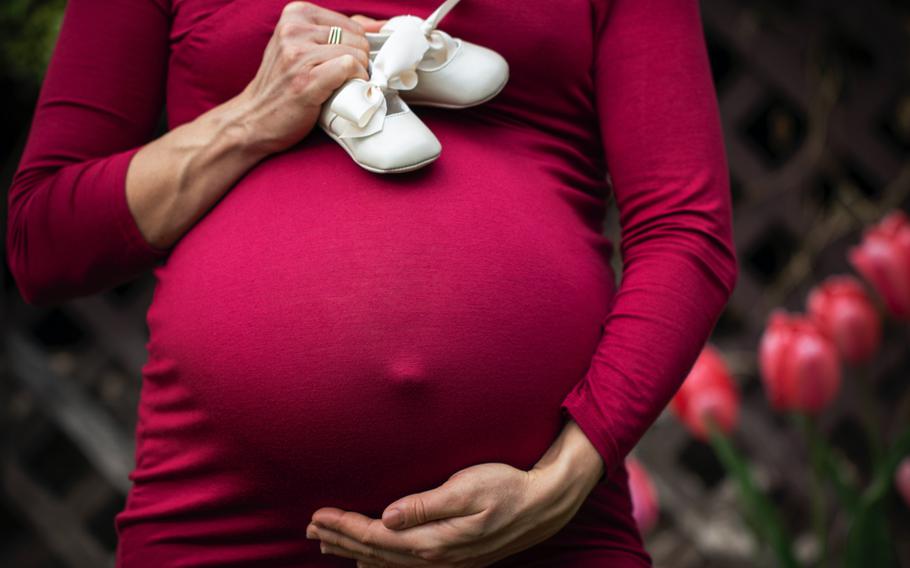
Pregnant people infected with the coronavirus have a seven times higher risk of dying compared with pregnant individuals who are not infected, a finding that arrives amid renewed calls for vaccination of those who are expecting a baby. (Pexels)
Stars and Stripes is making stories on the coronavirus pandemic available free of charge. See more stories here. Sign up for our coronavirus newsletter here. Please support our journalism with a subscription.
Pregnant people infected with the coronavirus have a seven times higher risk of dying compared with pregnant individuals who are not infected, a finding that arrives amid renewed calls for vaccination of those who are expecting a baby.
Researchers, whose findings were published Monday in the journal BMJ Global Health, pooled patient data from more than 13,000 pregnant individuals included in 12 studies from 12 countries, including the United States. Along with a higher death rate, infected pregnant people had a greater risk of being admitted to an intensive care unit, needing a ventilator or developing pneumonia if they have a coronavirus infection.
Infants born to those with a coronavirus infection during pregnancy also had a greater risk of developing severe outcomes. They were twice as likely to need treatment in the intensive care unit after birth and had an increased risk of being born preterm.
Emily R. Smith, the study’s lead author and an assistant professor of global health at George Washington University Milken Institute School of Public Health, said vaccination rates for pregnant people are low probably because “the assumption is that if a person is pregnant, they are probably young and for the most part healthy.”
Pregnancy outcomes overall have improved over time, but it is not a health-neutral event. The risk of health complications increases during pregnancy, even without a viral infection. And the coronavirus adds another layer of risk that could increase the chances of developing severe outcomes.
Being pregnant, even if a person has no underlying medical conditions, puts them at increased risk of developing severe illness if they are infected with the coronavirus.
While newborn death from a coronavirus infection remains rare in the United States, infants born to a person with a coronavirus infection close to the delivery date had a 2 percent chance of testing positive for the virus in the first days after birth, according to the American Academy of Pediatrics.
The implications for cognitive and physical developmental issues for an infant or child remain unclear as the research surrounding post-coronavirus impact on this age group continues to develop.
This is why many health associations, such as the American College of Obstetricians and Gynecologists and the Society for Maternal-Fetal Medicine, recommend the coronavirus vaccine to pregnant individuals. Despite the public health messaging, the Centers for Disease Control and Prevention estimates that the number of individuals who received a coronavirus vaccine before and during pregnancy at a given time has declined since 2021.
As of May 2022, about 29 percent of women who were pregnant or planned on becoming pregnant believed some form of misinformation surrounding the coronavirus vaccine, according to a poll from the Kaiser Family Foundation, a nonprofit health-policy organization. Some of the unsubstantiated claims about the vaccine’s impact included effects on fertility and breastfeeding.
The survey found that even if there is confidence overall in vaccines for adults, hesitancy can emerge when someone is having a child or trying to become pregnant.
Kathryn Gray, a maternal-fetal medicine specialist at Brigham and Women’s Hospital in Boston, said misinformation surrounding vaccines can be partly attributed to anti-vaccine rhetoric on social media.
“It’s become a political issue, and I think our health policy messaging has not remained at the level it should be,” Gray said. “People are still dying of it, and there is inadequate health public policy messaging given the significant health consequences.”
Outside of pregnancy, overall global vaccination rates have waned, and pandemic fatigue has affected much of the world, causing the steep decline.
Despite mounting evidence that vaccines significantly reduce the risk of death and hospitalization from an infection with SARS-CoV-2, Smith said the push to vaccinate younger people is a global concern and not isolated to the United States.
Jennifer L. Lighter, a pediatric infectious-disease specialist at NYU Langone Health, added that there needs to be a more significant push in the health community to get people vaccinated during pregnancy. “Some gynecologists and obstetricians are not prioritizing giving it,” she said.
Smith said she hopes this study will encourage more pregnant individuals to get the coronavirus vaccine.
“It’s not some extreme advice here,” Smith said. “But it is important to know that pregnant people are at greater risk when they get covid, so getting vaccinated and taking some of these precautions is worthwhile.”